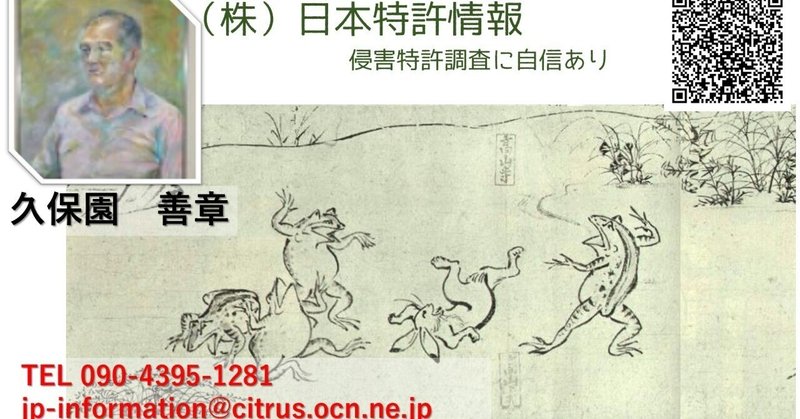
どうする特許庁! 目覚めよ審査官!! 本当にもう、杜撰(ズサン)で、お粗末な「審査」(サーチ)による特許付与を、です。
知的財産高等裁判所により、「権利無効」とされたものの75件目です。
https://drive.google.com/file/d/1xtuDzecOoeCSZmk36w2DenP05o0UnHBI/view?usp=drive_link
特許権者である原告の株式会社神戸製鋼所は、自分が保有する特許第3,766,725号(油冷式スクリュ圧縮機)について、その特許の「有効性」を検証したか不明です。
「有効性」とは、自社の特許についての、例えば「無効資料調査」等を行うことで、たとえ利害関係者などの第三者からの「無効審判」を起こされても、自社の特許は盤石であると確信することです。
それにも拘らず、株式会社神戸製鋼所は、特許庁より与えられた特許を有効と信じて、被告である株式会社前川製作所を特許侵害している、と提訴しました。
大阪地方裁判所においては、原告は勝訴しています。
しかしながら、知的財産高等裁判所は、「本件発明に係る特許は,特許無効審判により無効にされるべきものと認められ,特許権者である一審原告は,一審被告に対して本件発明に係る特許の特許権を行使することはできない。」とし、結局、控訴人は敗訴しました。
その根拠として、「乙114発明」(特公昭51-36884)を先行技術文献として挙げています。
この文献は、審査段階では見つけることが出来なかった文献です。
登録調査機関であるIPCCの検索者(舟田典秀)は上記の「乙114発明」(特公昭51-36884)を含まない「Y文献」を4件、審査官に提示しています。
審査官は検索者から提示された4件の文献をそのまま出願人に示しています。
その後、出願人より「手続補正書」が出されて、結局、審査官は「登録査定」をしました。
登録後は、無効審判が2件起こされていますが、いずれも却下されて権利は存続していました。
更に、登録後の経緯です。
原告が大阪地方裁判所に提訴して一部勝訴し、その後知的財産高等裁判所で敗訴するまでの間の特許庁での審判などがこれまた面白いです。
結局、無効審判により無効にされるべき、との判断がくだされました。
本件の根本原因は、特許庁段階で、知的財産高等裁判所で提示された「乙114発明」(特公昭51-36884)を探すことが出来なかったことに問題があると考えます。
IPCCの検索者が「乙114」(特公昭51-36884)文献を見つけていさえすれば、と思います。
因みに、「乙114」(特公昭51-36884)「特開昭48-30108」の「出願情報」のうち分類関係をその公報の右側に緑色の枠内に表示しました。
本件特許公開(特開平10-122168)の「出願情報」を比較して、共通するものは「テーマコード」の(3H005)だけです。
そして、「FI」と「Fターム」には、共通するものが全くありません。
このことは、「分類」のみによる【検索論理式】は間違いであることを示唆しています。
「検索用語」を使用しての検索式による母集合を得なければなりません。
常に、同一カテゴリーの「技術主題」のハイブリッド検索式(検索用語+FI+Fターム)による【検索論理式】を作成して、調査対象の母集合を得る必要があります。
特許庁の審査官は、所謂「サーチ」ではない、正しい「先行技術調査」を学び直す必要があると思います。
特許庁の審査官による、不十分な「サーチ」に基づいての、特許付与は許されません。
従って、本来なら、株式会社神戸製鋼所の出願に対して、特許庁は特許を与えるべきでなかったと考えます。
「行政」(特許庁)としては、「司法」(裁判所)により誤りを指摘されたことを謙虚に反省し、その誤りを正すことを心掛けるべきです。
特に、審査官が登録調査機関の検索者を指導して作らせている「検索論理式」、又は自らが作成していると思われる「検索論理式」の作成を、根本的に改革すべきです。
ここで、本件特許公開(特開平10-122168)の「出願情報」のうち「FI分類表」と「Fタームリスト」を、本エクセル資料の2シート目以降に挙げておきました。
( Google Translation )
What will the patent office do! Wake up Judge! !
It's really a sloppy and poor "examination" (search) to grant a patent.
This is the 75th case in which the Intellectual Property High Court has determined that the rights are invalid.
It is unclear whether Kobe Steel, the plaintiff, the patent holder, has verified the "validity" of its patent No. 3,766,725 (oil-cooled screw compressor).
"Validity" means that even if a third party such as an interested party raises an "invalidation trial" by conducting, for example, an "invalid material investigation" for the company's patent, the company's patent is It is to be convinced that it is rock solid.
Despite this, Kobe Steel Co., Ltd. believed that the patent granted by the Patent Office was valid and sued the defendant, Mayekawa Seisakusho Co., Ltd., for patent infringement.
The plaintiff won the case in the Osaka District Court.
However, the Intellectual Property High Court ruled that ``it was recognized that the patent pertaining to the invention in question should be invalidated in a patent invalidation trial, and the plaintiff of the first instance, who is the patentee, filed a patent application for the invention in question against the defendant of the first instance.
The patent right cannot be enforced.”
In the end, the appellant lost the case.
As a basis for this, "Otsu No. 114 Invention" (Japanese Patent Publication No. 51-36884) is cited as a prior art document.
This document could not be found at the screening stage.
A searcher (Norihide Funada) of the IPCC, a registered research agency, presented four "Y documents" that do not include the above "Otsu 114 invention" (Japanese Patent Publication No. 51-36884) to the examiner.
The examiner shows the applicant the four documents presented by the searcher as they are.
After that, the applicant issued a "Written Amendment", and in the end, the examiner made a "decision of registration".
After registration, two invalidation trials were filed, but both were dismissed and the rights continued.
In addition, it is the history after registration.
It is also interesting to see the trial at the Patent Office between the plaintiff Ifiling a lawsuit with the Osaka District Court, winning a portion of the case, and then losing the case at the Intellectual Property High Court.
In the end, it was decided that it should be invalidated by an invalidation trial.
We believe that the root cause of this case is that the Patent Office was unable to find "Otsu No. 114 Invention" (Japanese Patent Publication No. 51-36884) presented at the Intellectual Property High Court.
As long as the IPCC searcher finds the document "Otsu 114" (Japanese Examined Patent Publication No. 51-36884), I think.
By the way, the classification relationship among the "application information" of "Otsu No. 114" (Japanese Patent Publication No. 51-36884) and "JP-A No. 48-30108" is displayed in the green frame on the right side of the publication. Comparing the "application information" of this patent publication (JP-A-10-122168), the only thing in common is the "theme code" (3H005).
And "FI" and "F-term" have nothing in common.
This suggests that the [search logic expression] based only on "classification" is a mistake.
You have to get the population by the search expression using the "search term".
It is always necessary to create a [search logic formula] using a hybrid search formula (search term + FI + F term) of "technical subjects" in the same category to obtain a population of research targets.
I think that patent office examiners need to relearn correct "prior art searches" rather than so-called "searches."
A patent will not be granted based on an inadequate "search" by a patent office examiner.
Therefore, I believe that the JPO should not have granted a patent to the application filed by Kobe Steel, Ltd.
As the “administration” (the Patent Office), we should humbly reflect on the fact that the “judicial” (the court) pointed out the error, and should try to correct the error.
In particular, the creation of the "search logic formula" that the examiner instructs the searchers of the registered search organization to create, or the "search logic formula" that is considered to be created by themselves should be fundamentally reformed. is.
Here, the "FI classification table" and "F-term list" of the "application information" of the patent publication (JP-A-10-122168) are listed from the second sheet onwards of this Excel document.
(Google 翻译)
专利局会做什么! 法官醒醒吧! !
授予专利确实是一项草率且糟糕的“审查”(检索)。
这是知识产权高等法院判定该权利无效的第75起案件。
目前还不清楚专利权人原告神户制钢所是否验证了其第3,766,725号专利(油冷螺杆压缩机)的“有效性”。
“有效”是指即使利害关系人等第三方通过对公司的专利进行“无效材料调查”等方式提出“无效审判”,该公司的专利仍应被确信是坚如磐石。
尽管如此,神户制钢所仍认为专利局授予的专利有效,并向被告前川制作所提起专利侵权诉讼。
原告在大阪地方法院胜诉。
然而,知识产权高等法院裁定:“在专利无效审理中,认定涉案发明专利应当被宣告无效,一审原告即专利权人向专利权人提出了诉讼请求。” “一审被告的专利权不能被执行。”
最终上诉人败诉。
作为其基础,作为现有技术文献引用了“大津第114号发明”(日本专利公开第51-36884号)。
在筛选阶段无法找到该文件。
注册研究机构IPCC的检索员(船田则英)向审查员提交了不包括上述“大津114发明”(日本专利公开第51-36884号)的四份“Y文献”。
审查员向申请人展示检索员提交的四份文件的原样。
之后,申请人出具了“书面修改意见”,最终审查员做出了“注册决定”。
注册后,曾两次提起无效审判,但均被驳回,权利继续。
另外,就是注册后的历史记录。
专利局的审判也很有趣,原告向大阪地方法院提起诉讼,赢得了部分案件,然后在知识产权高等法院败诉。
最终决定通过无效宣告宣告无效。
我们认为,本案的根本原因是专利局未能找到向知识产权高等法院提交的“大津第114号发明”(日本专利公开第51-36884号)。
我想,只要IPCC检索员找到文献“Otsu 114”(日本审查专利公开号51-36884)。
顺便说一句,“大津第114号”(日本专利公开第51-36884号)和“JP-A第48-30108号”的“申请信息”之间的分类关系显示在右侧的绿框中出版物的一面。
比较该专利公开(JP-A-10-122168)的“申请信息”,唯一的共同点是“主题代码”(3H005)。
而且“FI”和“F-term”没有任何共同点。
这表明仅仅基于“分类”的[搜索逻辑表达式]是一个错误。
您必须使用“搜索词”通过搜索表达式来获取人口。
总是需要使用同一类别中“技术主题”的混合搜索公式(搜索项+FI+F项)创建[搜索逻辑公式],以获得研究目标的总体。
我认为专利局审查员需要重新学习正确的“现有技术检索”而不是所谓的“检索”。
由于专利局审查员的“检索”不充分,不会授予专利。
因此,我认为日本特许厅不应该对神户制钢所提出的申请授予专利。
作为“行政部门”(专利局),我们应该虚心反思“司法部门”(法院)指出的错误,并努力纠正错误。
特别是,审查员指示注册检索机构的检索人创建的“检索逻辑公式”的创建,或者被认为是由其自己创建的“检索逻辑公式”的创建应该从根本上进行改革。
这里,从该Excel文档的第二页开始列出专利公开(JP-A-10-122168)的“申请信息”的“FI分类表”和“F项列表”。
この記事が気に入ったらサポートをしてみませんか?
